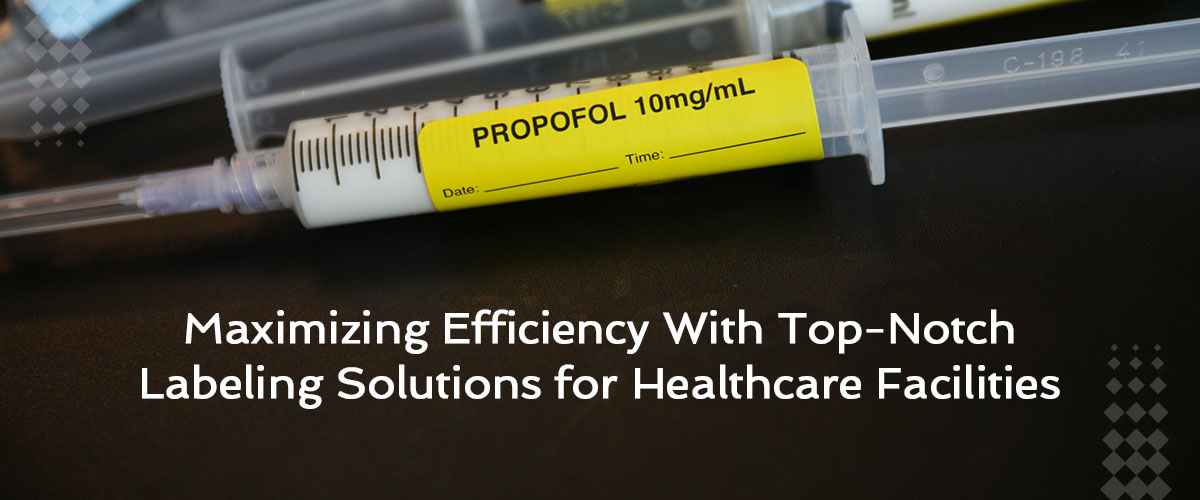
Hundreds of patients visit hospitals every day, and the doctors, nurses and other staff members are working hard to give those patients the best medical care. Emergency and medical procedures are not the only way to deliver that care. By using proper labeling practices, patients and staff can stay safe at the hospital.
Ensuring that your labels have proper information is vital for patient care, whether it be medication, hazardous materials, specimens, patient charts and rooms, relevant documents and more. All staff must work together to ensure that everything is labeled correctly and everyone is following the guidelines written on the labels.
There are numerous types of labels used in hospitals and healthcare environments. Labels make it easy to convey important information quickly and in an easy-to-read format. Here are some of the most common types of hospital labels:
Pharmacy labels: Pharmacy and medication labels are essential for both the hospital and the patient. Proper labeling helps healthcare professionals administer the correct medications and directs patients on how to take their medication.
Anesthesia labels: Anesthesia supplies need to be labeled to ensure a patient is receiving a safe dosage and type. Labels help reduce the risk of human error.
Laboratory labels: Laboratory labels help with patient identification, which helps get test results and diagnostics back to the right patient quickly.
All of the information above needs to be clearly labeled to ensure the patient is using the medication properly. When labeling specimens in the lab, this information must be included on the label:
Hospitals and healthcare facilities are bustling, busy spaces, making it easy for mistakes to happen when labeling. Here are a few common labeling errors to be aware of:
When it comes to labeling medications, the following must be included:
Patient's first and last name
Prescribing doctor
Drug name
Dosage
Strength
Directions of use
Quantity prescribed
Any refills, if necessary
All of the information above needs to be clearly labeled to ensure the patient is using the medication properly. When labeling specimens in the lab, this information must be included on the label:
Patient's first and last name
Hospital medical record number
Collector's ID
Time and date the specimen was collected
Every sample must be labeled appropriately to ensure there are no mix-ups at the lab. Many labs will also reject unlabeled samples. Patient documents must also be clearly labeled with any allergies, health issues, current medications and any other information that is important for their care. During an outbreak, proper labeling is especially vital. This can help prevent the spread of diseases even further. For instance:
Patient samples: Samples that have been taken by those potentially exposed to a virus must be labeled correctly. This will ensure that proper procedures will be followed if test results come back positive.
Quarantined areas: Marking quarantined areas and what to do when entering these areas should be clearly stated. This will help ensure that those who are treating the patients are protected against infection.
Since there are numerous label needs and various factors that can affect them, it's important to be sure you're using the most effective labels. To help you find the best labels for any situation, here are a few considerations to make:
Storage: Where your labels get stored can affect the bond to the bottle and more. For example, some medications and drugs need to be refrigerated. Be sure that the labels used on these drugs can withstand cold temperatures so there's less risk of them falling off or shrinking.
Printer compatibility: Be sure that any labels you have are compatible with your printer system. Without printer compatibility, you'll be unable to properly print labels. If you can't use your printer to create the labels you need or want, consider ordering from a printing service like Nev's Ink.
Printed vs. written labels: Decide whether you'll use written or printed labels. While writing on labels can be convenient, written labels are much more likely to smudge. To help prevent the risk of smudges, look for smudge-proof labels or consider simply printing them instead.
At Nev's Ink, we carry high-quality labels for all your hospital labeling needs. We understand the urgency for labels in a hospital environment, which is why our process allows for stock items to be delivered right away. We also know that keeping costs low is essential. We operate at a minimal cost, so we can pass those savings onto our customers. For more information on our hospital labels, visit our website or give us a call at 1-800-638-7465. We will answer any questions you may have. Contact Nev's Ink today!